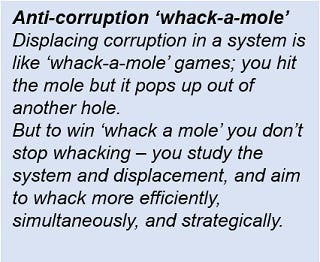What I'm reading on governance & conflict - #21
What sparked discussions in my Zoom classroom today: corruption messaging, social norms, young activists & gender
The Masters students in my Governance & State-building module were so engaged this morning in our seminar on corruption that I had to promise to send them all sorts of additional reading. I've decided to share it here as well in case it’s of use to others. Waste not, want not…
Corruption messaging research was a big topic for discussion. Caryn Peiffer's most recent research on corruption messaging was with Nic Cheeseman, and they've just published this article in the Mail & Guardian on their research in Lagos. She's also done research in Indonesia and Papua New Guinea. Other researchers have done similar research in Costa Rica, and all come to pretty much the same conclusion: anti-corruption messaging not only doesn’t work but often backfires.
There is a lot of ongoing research on social norms and corruption that could help with changing how corruption messaging is done. Leena Koni Hoffmann leads research on this for Chatham House, and the team’s first report on Nigeria is here. You can see her talking about 'When corrupt behaviour is the rational choice' where she mentions the need to be much more careful about messaging and to rigorously test campaigns in advance.
Nils Kobis had a great Twitter thread on research from South Africa that tested social norms messaging that specifically challenges the belief that most (other) people see corruption as ‘normal’.


This graphic shows the impact of the messaging which is promising (though it should, of course, be tested further beyond the single site/message).
I'm on the advisory board of a great research project led by Tufts University on social norms and corruption in fragile and conflict-affected contexts, and their recent policy paper has lots of great advice on this and many other things for anti-corruption practitioners.
In class, I mentioned the analogy of anti-corruption being like the British game of 'whack a mole', sharing a blog that I co-wrote with DFID colleagues on ‘The machinery of government and the mechanics of governance’ where we use it this to illustrate a point about displacement strategy.

A recent blog by Liz David-Barrett and team on corruption in procurement also looks at why continuing to 'whack the mole' isn't enough.
Some of my students are already doing great work as anti-corruption activists and reformers, whether as lawyers or investigative journalists and so on - and there are tons of resources out there for young people interested in fighting corruption. Transparency International have a special 'Anti-Corruption Kit' for young activists, for example, while the Accountability Lab does amazing hands-on work in a number of countries around the world that’s sure to inspire. Next year there will be a special session of the UN General Assembly on corruption, and I encouraged them to look for opportunities to engage with it.
Finally, gender and corruption was a subject that kept us going well into the following time slot, and I shared something that I’ve already written about in a previous ‘What I’m reading…’. It was so popular that I’ll repeat it here...
I like this blog by Kiely Barnard-Webster on ‘The value of a stereotype: women resisting corruption’ (Links to an external site.). She makes a strong case for the need for gender analysis in anti-corruption programming; if corruption is about abuse of power, surely we have to know what power is available, who wields it and how feasible it is to resist it, right? In their work in the DRC, they found that women are expected to be ‘guardian of values’, and while some women felt empowered by this, others felt it to be a burden. It reminded me of one of my favourite film scenes (based on one of my favourite novels): the 1994 version of Little Women with Winona Ryder. The scene takes place in New York City in the 1860s, and Jo March (my absolute childhood hero) is sitting quietly while a group of intellectual, liberal men are discussing why women should get the vote. I won’t spoil the scene, which is only one minute long, but I love this. In fact, I play it to my masters students when I teach on corruption, and they all get to see me tear up a little bit, year after year…




